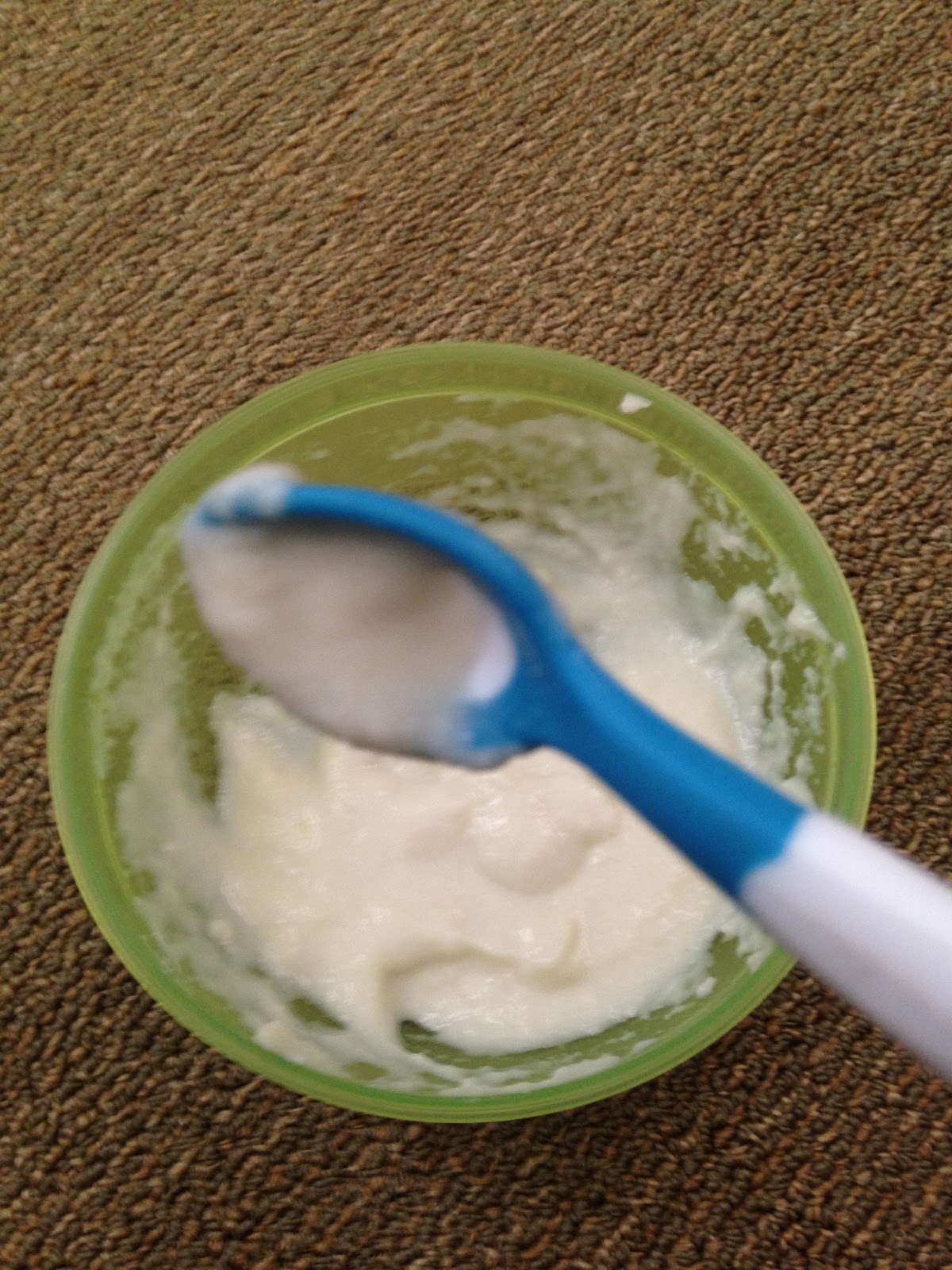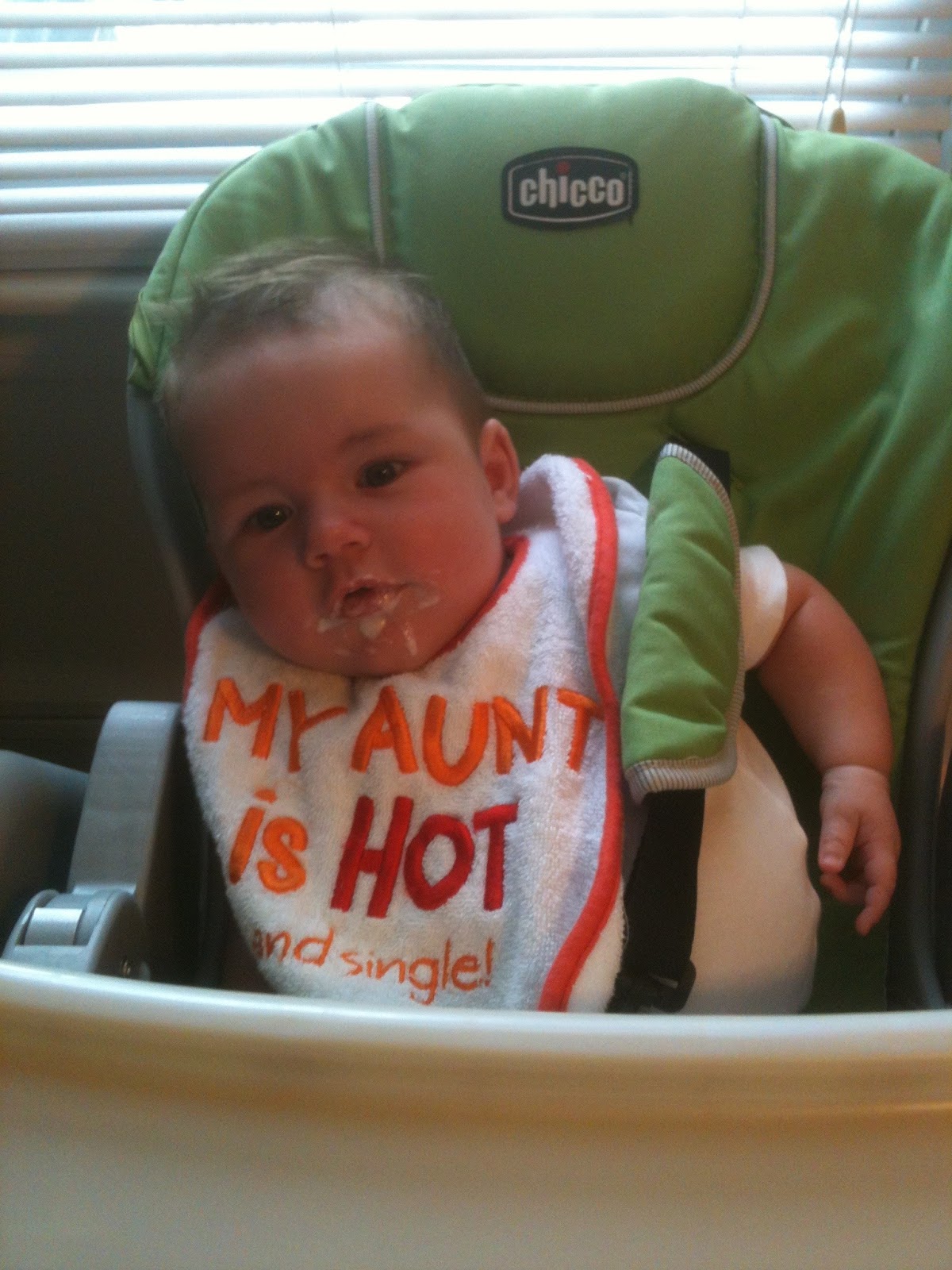Note: I drafted this post over two years ago, but never finished it up. I figured it’s worth sharing since many of my friends have little ones and/or are planning to in the near future…
Typically pediatricians recommend that babies start being introduced to solid foods between four and six months, so I was not surprised when I took Andrew to his four month appointment last week and his doctor said he was ready. We started with rice cereal for the first three days. I attempted to feed him once the first day and twice a day after that. I say attempted because for the first few days, while baby is getting used to feeding, it is not unusual for him to spit out more than he takes in. On day four, I introduced sweet potatoes. Today, day six, was a busy day, so we skipped Andrew’s morning “meal”, opting for a bottle of formula instead. However, for dinner, he ate an entire cube of sweet potatoes (approx. 1 oz). Here are some tips that helped me, and Andrew, with the transition.
1. Set realistic expectations. As mentioned above, it is not uncommon for babies to appear to spit out food for the first few days, or possibly longer. It doesn’t mean your baby is not ready or that something is wrong. He/she is tasting the food and learning how to swallow, so it’s a totally natural part of the process. It is unrealistic to think that baby will be able to make a jump from a formula and/or breast milk diet to three meals a day right out of the gate. Start with one or two attempts per day.
 |
| Andrew after his first meal. |
2. Start small. It may seem like common sense, but babies are not going to eat much at first. It is also smart to slowly introduce foods to be sure that baby does not have an allergy. Whatever you decide to start with, be it rice cereal or a fruit or veggie, start with a small amount. Wait at least three days before introducing a new food as this makes it easier to determine if baby is allergic or if a certain food does not agree with him/her. I started with a small amount of rice cereal mixed with formula. I made the consistency a little thinner for the first couple of days. It should also be mentioned that you do not need to start with cereal. It is just a popular choice because it is generally well tolerated, and, because it is mixed with formula or breast milk, somewhat a familiar taste.
 |
| Rice cereal mixed with formula. Make the consistency even thinner for a newbie. |
3. Avoid feeding baby when he/she is too hungry and/or tired. Babies are human, obviously, so when they are feeling too sleepy or ravenous, they are not going to have the patience to learn a new skill. Use baby’s current routine to determine a time during the day that would be best to start introducing solids. Andrew typically has his bedtime bottle between 530 and 630 depending on when he wakes from his afternoon nap. I try to feed him about an hour before I plan to put him to bed, which tends to be directly in between bottle feedings. He is interested in food at this point since he hasn’t just eaten, but he is not so hungry that he wants the instant gratification of a bottle. If baby is cranky, I wouldn’t force a solid feeding. It’s just going to lead to frustration for both parent and baby.
 |
| Happy Baby. Successful Feeding. |
4. Be patient. As with all things parenting, it’s important to remember it’s not a race. Some babies adapt to solids faster than others. Some days are better than others. Your baby might have great feedings for a couple of days and then seem completely uninterested the next day. Welcome to parenting. Children are intrinsically inconsistent; it is up to parents to create consistency. So, try to establish routine mealtimes for baby, but don’t force things if it just isn’t working out one day. You’ll be surprised at how fast your adapts. With both of my kids, I was skeptical as they spit out pretty much every spoonful. But, I could tell they were tasting and enjoying, so I stuck with it, and it was a matter of days before they had it down.
 |
| Chunky Chace had a similar introduction to solids, however, he started closer to six months due to being a preemie. |
5. Don’t stress. At this age, babies should still be getting the vast majority of their nutrition from formula or breast milk. Appetites change day to day, and sometimes schedules don’t permit a completely ideal meal setting. Roll with it. Work with baby’s natural schedule to establish a meal time (you’ll eventually work up to three, but only need to start with one), feed him or her for as long as he/she seems interested, and then continue with with the regularly scheduled program. Even though the results are not usually instantly gratifying, you will notice a progression. It’s not worth getting wound up over, especially since babies can smell fear and stress. Blood in the water!
 |
| Uncle Chip getting in on feeding Chace. |